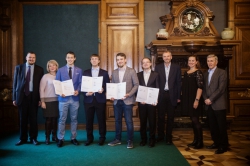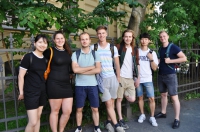Options
№1: Short-term trips - all trips that last up to a month. These usually include conferences, summer and winter schools, intensive educational courses (common in Finnish universities, for instance), and internships.
№2: Exchange semesters at partner universities. You’ll get to spend an entire semester at an international university of your choice without any detriment to your studies at ITMO.
№3: Double-degree Master’s program. This is a choice you’ll have to make before applying for a Master’s program. Spend one year in St. Petersburg and another abroad at a partner university and get two diplomas in one stroke!

Where to go
ITMO University is partners with many universities in Finland, France, Germany and other countries. It has also recently established relations with Kindai and Saitama Universities (Japan), six universities from Brazil and several more from Italy. You can see the complete list of ITMO’s partner universities here.
Students can choose where to go only for short-term or semester programs. Double-degree programs do not provide such options.
For short-term courses, students pick courses of their liking and apply for them.
For exchange semesters, there are two options: students can either pick a program themselves or ask for assistance from the staff of ITMO’s International Educational Programs Department. It’s important to keep in mind that semester exchange programs must correspond to your area of study at the university, e.g. if you’re studying optics in St. Petersburg, you can’t apply for a Natural Sciences program in France. Click here for a list of useful web-resources where you can learn more about the available semester exchange programs at ITMO’s partner universities.
“We recommend that you look for a suitable semester exchange program in advance before coming to our office; this would save us and you some time. Still, if you can’t decide, we’ll be there to help,” – comments Ekaterina Tulugurova, head of International Educational Programs Department.

It’s also important to have your individualized curriculum plan approved by your educational department at ITMO, meaning that you must notify your department about your trip with an official application and receive a confirmation. You’ll need to outline which subjects you’ll still be able to learn at the partner university and which ones you’ll still need to pass upon coming back to St. Petersburg. This is why the choice of a program is important – it’s better to pick a program that offers subjects similar to those you’re learning at ITMO University. Still, it’s fairly rare that exchange students manage to complete all their subjects while abroad, so it’s likely that you’ll still need to pass a few exams upon your return.
“If you don’t apply for an individualized curriculum plan, your exams will be considered failed, and upon returning to St. Petersburg you will be expelled. This is why we remind our students – you must do this! Of course, sometimes a department doesn’t want their students to go away for a semester. There could be several reasons for that: maybe there are some important courses planned for this semester, or an industry internship, or the student might miss out on completing a research project. For this reason, we ask our students to notify their scientific advisor or the department about their plans as early as possible,” – says Ekaterina Tulugurova.
For double-degree programs, your choice is made when you enroll. Therefore it is known to you just where (and when) you’ll go, as the curriculum is drawn up in advance.

How to take part in an academic mobility competition:
- Fill out the form;
- Write a motivational letter;
What should you write in a motivational letter? First of all, describe why you’d like to go. Any reason might be a good one, except for tourism. It’s important that you yourself understand why you want to go study abroad.
- Compile a CV;
- Receive your foreign language skill certificate;
What is a language skill certificate? To be accepted into certain programs (and mandatory when applying for a double-degree program), you must provide a confirmation of your knowledge of the language in which subjects are taught at the partner university. Students are often asked to provide an English language certificate like IELTS or TOEFL with a skill level of at least B1 or B2. Certificates are issued by licensed testing centers; if one of these certificates isn’t required, you can request an English knowledge certificate from ITMO’s Foreign Languages Training Center.
- Pick three universities (three programs) you’re applying to and sort them in priority order (first being the most desirable);
- Send the above documentation to outgoing@corp.ifmo.ru
- Attend an interview at ITMO’s International Educational Programs Department in the language of education at your desired university;
What is the interview about? Our experts’ main task is to make sure you have your priorities set properly and are prepared for the challenges of studying in a foreign country, being a part of a different culture and learning environment.
- Pass the competition;
- Be nominated to participate in the program;

Do I need to make an application to the chosen university? No. Staff at the International Educational Programs Department will do that for you. In case of the more popular programs, the applications from students with stellar grades and high language levels will be sent out first. Nevertheless, all the applications will eventually be submitted to partner universities.
- Upload all the documentation necessary to take part in an exchange program to the partner university’s website; this must be done in the specified time interval, otherwise the university will restrict access to its informational system and you’ll miss out on your chance to participate.
- Your chosen partner university will assign you a curator who will assist you with finding lodging and other mundane issues; follow the directions they will have provided you with.
- Get your invitation from the receiving university;
- Receive your student visa at the consulate/embassy of the country in which you will study;
- Complete your semester, internship or attend the conference;
- Return to St. Petersburg no more than five days after the end of your program/internship/visit.
It’s not as complicated as it might seem! And when you’ve succeeded and you’re going to study abroad, this process will seem like a small price to pay for this amazing, unforgettable experience. We’ve asked some of our students who have already participated in academic mobility programs to share with us their impressions:
Igor Katselenbogen, took a semester program at University of Seoul, South Korea

“This experience teaches you, first and foremost, to overcome obstacles and break stereotypes. You will be immersed into a foreign culture and stop separating your own country from the rest of the world. You’ll be among 200 students just like you – so don’t worry that about feeling lonely; very soon you’ll have lots of friends who are in a similar situation. Even if your language level isn’t very high, you still need to talk – nobody pays attention to your mistakes because they’re on the same level. As for the individualized curriculum plan, well, it isn’t really that much of a problem. You’ll get a lot of help with it both at ITMO and at the receiving university.”
Ilya Govyadko, took a semester program at Aalto University, Finland
“Don’t put off this opportunity or you’ll lose so much. Sure, there’s a quite a bit of paperwork to get through, but it’s not that hard if you follow the steps. And don’t worry about whether you can afford living abroad. ITMO University provides exchange students with funding; I did just well with it during my time in Finland. Studying there was very interesting: the university sets up a bunch of different events in addition to the core curriculum. On your return to St. Petersburg you might have some trouble with making up for missed subjects – that is, if you want to pass them with good or excellent grades. If you’re okay with passing grades, then it’s not that hard. It all depends on how ambitious you are.”
Anastasia Pisareva, studied at University of Tampere, Finland

“My individualized curriculum plan only matched with my exchange program’s by half. It was bothersome, of course, but it can still be dealt with, and others will help you. One advantage of going to study in Europe is that you can choose your subjects as long as you score 30 credits. Therefore I picked some subjects that matched my curriculum plan and some that I was simply interested in. For example, we met experts from Nokia and Microsoft, studied cases with them, and worked with experts. I wanted to present myself in the best light since I was also sort of a representative for my country. In truth, this sort of experience breaks any stereotypes you might have acquired from mass media and helps you become a citizen of the world. So it’s not just an internship that makes your transcript a little bit thicker – it’s about becoming a different type of person.”





